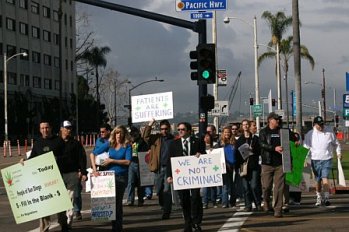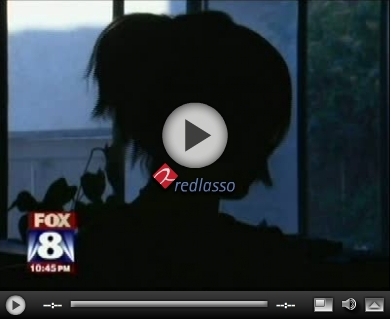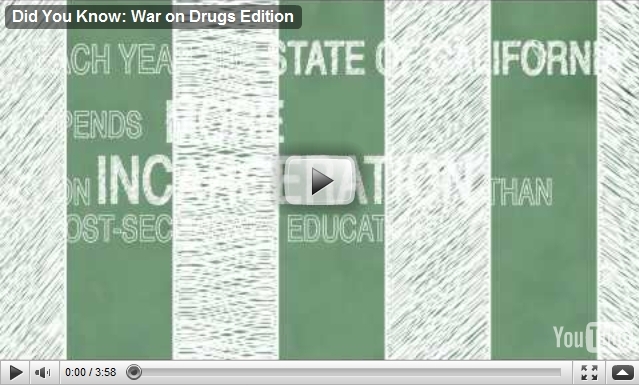BLOG
HOPHEAD CONFESSIONS!!! A DISEASE OR A CRIME???!!!
"The individual has always had to struggle to keep from being overwhelmed by the tribe. If you try it, you will be lonely often, and sometimes frightened.
Medical Marijuana Raids Continue Despite Obama's Pledge
Recent DEA raids in California are once again raising questions about the Obama Administration's commitment to respecting state laws: San Diego, CA -- Federal agents raided at least three San Diego-area medical marijuana dispensaries [Friday] in the early morning hours. Sources say that Green Kross, Unified Collective and Kush Lounge were all served federal search warrants and were subjected to aggressive SWAT-style raids which resulted in the arrest of as many as 12 people and the seizure of money, medical marijuana and patient records. These raids come as the City of San Diego is deliberating an ordinance to regulate the local distribution of medical marijuana. [Americans for Safe Access] It's possible, of course, that there were violations of state law taking place here, in which case the DEA's involvement would be consistent with Obama's policy. But it remains unclear why California police would need federal assistance enforcing their own laws. The cynical interpretation would be that the tendency of local juries to acquit medical marijuana defendants has led San Diego District Attorney Bonnie Dumanis to have the feds do her dirty work. Meanwhile in Mendocino: A marijuana activist group on Friday protested a federal law enforcement raid on a Mendocino County pot farm, saying it was protected by the county’s new medical marijuana cultivation ordinance. … The Covelo farm owned by Joy Greenfield, 68, was registered with Mendocino County authorities under an ordinance that allows medical marijuana collectives to grow up to 99 plants. … Federal agents removed 99 plants and took a computer and cash, the group said. Greenfield wasn’t there at the time. Mendocino County Sheriff Tom Allman confirmed Friday that the property owner had the proper paperwork and the marijuana was legal in the eyes of the county. [Press Democrat] Once again, there could be more to the story, but it sure sounds like classic DEA craziness. The grower's relationship with local law-enforcement casts doubt on the possibility of impropriety, so we're left wondering what the hell is going on here. Events like these are inevitable under a vague federal policy left to the whims of the DEA's bullying cowboy mentality. Only a change in federal law will bring an end to this, but for the time being, the Obama Administration would do well to eliminate all apparent departures from the well-received hands-off approach they've promised the American people. I don't see what's so hard about that. If circumstances emerge that absolutely necessitate DEA activity involving medical marijuana, then it shouldn’t be too hard to provide an explanation for why federal resources were needed. That's the very least you can do. Obama's pledge to respect medical marijuana laws enjoys broader public support than almost anything else he's done since taking office. Screwing that up would be stupid, cruel and pointless.
Why I'm here
This is my first entry. I want to stop the killing. I believe that legalization and regulation of all drugs is the way to this end.
Will the Marijuana Vote Help the Democrats in November?
That's the question everyone's asking this week thanks to this piece from Joshua Green at The Atlantic. The idea is that putting marijuana reform initiatives on the ballot could bring greater numbers of young, left-leaning voters out to the polls in November. With marijuana initiatives up for a vote in six states this year, we'll have an interesting opportunity to evaluate how other campaigns are impacted by the pot vote. [image:1 align:left]Whether the theory amounts to much is hard to predict and will be difficult to measure even after the polls close in November. But the fact that we're even talking about this is significant. Our political culture is fascinated with the idea that niche demographics can be mobilized in a cynical effort to shape the balance of power in Washington. Karl Rove's successful use of gay marriage bans to bring out conservative voters in 2004 is still widely regarded as an ingenious ploy that may have clinched the election for Bush. The mere notion that state-level marijuana reform efforts can impact national politics is a healthy dose of leverage and legitimacy for our movement. When political pundits begin speculating about our ability to bring out voters, that sends a message to politicians in a language they understand. For decades, the Democratic Party has remained shamefully silent on marijuana policy -- despite overwhelming support for reform within its base – all because party leaders persist in clinging foolishly to the 1980's mentality that any departure from the "tough on drugs" doctrine is political suicide. What now? Will the Democrats continue defending the arrest of their own supporters, even when doing so threatens to compromise their candidates in close races? Will the Republicans make a show of fighting back against legalization, even when doing so threatens to alienate the party's growing libertarian wing? What happens next is anyone's guess, but it's becoming clear that the surging marijuana legalization debate is pinching political nerves and creating opportunities for anyone clever enough to capitalize on it.
The War on Marijuana = Federal $$$ for Local Cops
If you've ever wondered how police departments can afford to send so many officers off into the woods looking for pot plants, the Wall Street Journal just figured it out: IGO, Calif.—Shasta County Sheriff Tom Bosenko, his budget under pressure in a weak economy, has laid off staff, reduced patrols and even released jail inmates. But there's one mission on which he's spending more than in recent years: pot busts. The reason is simple: If he steps up his pursuit of marijuana growers, his department is eligible for roughly half a million dollars a year in federal anti-drug funding, helping save some jobs. The majority of the funding would have to be used to fight pot. Marijuana may not be the county's most pressing crime problem, the sheriff says, but "it's where the money is." Every year, more money is spent and more marijuana is discovered. The growers then respond by planting still more. New records are set every harvest season, keeping growers and the police who pursue them steadily employed. The big losers in this ridiculous cycle of idiocy are the taxpayers, who spend billions on this stupid self-perpetuating escapade while neighborhood crimes go unsolved. Just because some people think legalizing marijuana might "send the wrong message," we're instead stuck in a massive domestic war that we can't afford, and we're losing worse every year. Meanwhile, cops and criminals just continue cashing in. For more, check out this interesting exchange between MPP's Mike Meno and a California reporter who's been following the story.
A Scary New Drug Threatens Our Children: Nutmeg
Just watch this news report and try not to laugh: My favorite part is at the end when the anchor concludes, "Wow. Well, parents have a very real concern about the nutmeg, but so far there are no reports of deaths from nutmeg overdose." That is classic. Here's the thing about nutmeg: it sucks. According to Erowid, its effects "are considered unpleasant by most who experience them." I've never heard it compared to marijuana before today. For thousands of years, nutmeg has disappointed people who were stupid enough to try getting high on it. So, there's actually only one way that an epidemic of nutmeg abuse could ever occur, and that's if someone makes news reports about how you can get high on it, stirs parents into a panicked frenzy, and inadvertently puts the idea in teenagers' heads to go screw around with giant bottles of nutmeg. Nice going, FOX.
Huff Post: UN Drug Policy in the Dark Ages
I'm on Huffington Post again tonight, with a post chastising the UN (and western governments generally) for: 1) continuing the ludicrous coca runaround in South America's Andean region for another year; and 2) turning a blind eye year after year to the indirect support that western funds and cooperation gives to the death penalty for nonviolent drug offenses, mostly in Asia and the Middle East. Check it out here -- comments welcome in either location. If you haven't already, check out our Chronicle articles on these two topics here and here.
What's the Big Deal About Narco-Subs?
The DEA is proud of having helped Ecuadoran authorities capture this "narco-sub":Silly DEA -- don't they realize what the implications are, of drug traffickers having the wherewithal to operate a submarine? It means they have effectively unlimited resources to devote to the task of finding a way to get their product from point A to point B, and to reducing the cost associated with doing so. If it's not over the border, it's under it. If it's not by air, it's on the sea. If not on the sea, then under the sea -- using narco-subs. Apparently lots of narco-subs: Oh, and don't forget, if not here, then there. Silly DEA. Random thought on the DEA photograph: Does this remind anyone else of Yoda in the jungle on his planet, using the force to lift the damaged spacecraft, Empire Strikes Back movie?
it's unfair... marijauna's not bad, it's them that keep it away from us good folks
thankfully some governments have realised the futility of the drug war against innocent drug users.
Marijuana Legalization is a Civil Rights Issue
This week's news that the California NAACP is endorsing Prop. 19 to legalize marijuana in California hasn't exactly been met with universal applause in the black community. Anti-pot crusader Bishop Ron Allen thinks it's a conspiracy, Big Ced at News One thinks NAACP is stoned, and blogger Mo' Kelly thinks they've lost sight of the distinction between civil rights and civil liberties:The issue of decriminalizing marijuana is a separate and distinct discussion from the inherent inequities of the criminal justice system. Both are legitimate issues, but not meant to be commingled. … The NAACP, the nation’s oldest CIVIL RIGHTS organization walking point on the CIVIL LIBERTIES issue of marijuana legalization is a farce and an embarrassment. Let the ACLU do what it does…so the NAACP (in California and beyond) can deal with real CIVIL RIGHTS issues… Ok, but the two aren't mutually exclusive. Let's not forget how these marijuana laws came about in the first place:In the eastern states, the "problem" was attributed to a combination of Latin Americans and black jazz musicians. Marijuana and jazz traveled from New Orleans to Chicago, and then to Harlem, where marijuana became an indispensable part of the music scene, even entering the language of the black hits of the time (Louis Armstrong's "Muggles", Cab Calloway's "That Funny Reefer Man", Fats Waller's "Viper's Drag"). Again, racism was part of the charge against marijuana, as newspapers in 1934 editorialized: "Marihuana influences Negroes to look at white people in the eye, step on white men’s shadows and look at a white woman twice." [Why is Marijuana Illegal?] The decision to prohibit marijuana was fueled by racist hysteria, and many have argued that the decades of racially disparate enforcement that followed weren't entirely coincidental. Whether or not our marijuana laws were intended to serve as an instrument of racial oppression, they've performed that function with staggering precision. And when people of color receive unequal treatment under the law, that's a civil rights issue. Our marijuana laws have never, and will never, be enforced fairly. The brutality of modern drug enforcement reaches every community, but if young white men were given criminal records and subjected to profiling and police harassment at the same rates as people of color, the criminal justice system would quickly come to a crashing halt. The drug war was built on a foundation of fundamental unfairness, and mitigating its catastrophic impact on communities of color requires measures far more drastic than telling police for the millionth time that there's more to their job than searching young black men all day and night. No, legalizing marijuana won't solve the problem. Not even close. But what it will do is remove one of the primary justifications police rely upon when stopping and searching people in urban communities. It will stop the hemorrhaging of employment opportunities lost by those convicted of simple possession. It will cripple the existing distribution model, thereby reducing youth involvement, street violence and the cyclical lure of the prohibition economy and the severe criminal justice consequences faced by its participants. It will shield generations from the fate that our formerly pot-smoking President was so desperately lucky to have avoided. If anyone thinks we can solve these problems while still making nearly a million marijuana arrests every year, then please explain. But don't condemn NAACP for supporting a new approach when the old one has failed as consistently and dramatically as it has.
A Brilliant Exhibit in the Failure of the Drug War
The International Centre for Science in Drug Policy is doing amazing work. Check this out:
Is Bill O'Reilly Helping Us Legalize Drugs?
A couple readers objected to my suggestion last week that Bill O'Reilly's anti-drug scare tactics are actually helping our cause more than they hurt it. Here's what they said:"I'm very displeased with most of these TV interviews. Between Mr. O'Reilly's constant use of voodoo pharmacology and emotional appeals, Mr. Nadelmann never really got a chance to articulate the finer points of legalization. Until we get longer fairer interviews, I'm not convinced that these TV spots do any good.""I have to disagree with Scott's post. Dogmatic idiots like O'Reilly and his 'chronic' (pun intended) listeners can't be schooled. Not by reasoned argument, anyway. That's the big problem re. all the societal problems we face: there's so many dogmatic idiots, and way too many of them, like O'Reilly, have public megaphones via corporate sponsored mass media. Imo, it's better to just accept that quite a few people are unreachable, and instead, try to reach those who still have a modicum of intelligent open-mindedness." I understand how one could conclude that our efforts are undermined when a prominent voice like O'Reilly speaks out against us before a massive television audience, nor would I argue that there's no such thing as bad publicity for the cause of drug policy reform. But Bill O'Reilly's brand of dubious DEA-derived data and authoritarian posturing is unlikely to come as a major revelation to anyone in his audience. His tactics are nothing more than classic prohibitionist nonsense; the same stuff that's failed quite consistently to turn back our momentum.Over and over again, O'Reilly's attacks have come from a defensive stance, as he reacts to our efforts by condemning the latest drug reform book or campaign. In the process, he inadvertently presents and legitimizes our argument before an audience that we'd otherwise struggle to reach. He props up reform leaders with primetime television exposure and further establishes the now-undeniable rise of drug policy reform into the realm of mainstream political debate. In the meantime, support for drug policy reform among conservatives surges like never before and national support for marijuana legalization has never been higher than it is today.So if I had a choice between O'Reilly attacking us every day of the week, or ignoring us entirely, I'd choose the former without hesitation. If you don't think it's possible to advance a political agenda by quarreling with Bill O'Reilly, consider the fact that Al Franken is now a U.S. Senator.
Criminals Arenât the Only Ones Getting Killed in the Drug War
Via Pete Guither, here's another breathtaking example of the drug war's indiscriminate violence:President Calderón has sought to make his drug war palatable by asserting that the countryâs war deadâestimated at 23,000 since January 2006 for the country as a wholeâdeserved to die: their deaths implicate them in illegal activities.When he first learned about what Juarenses have come to call the âmassacre at Villas de Salvarcar,â Calderón hinted that the thirteen teenagers who died at the hands of professional executioners were common criminals and city low life. He could not have been more wrong. In fact they were honor students and athletes who had gathered to celebrate a friendâs seventeenth birthday. They had the misfortune of belonging to a football club whose initials, âAA,â were mistaken for the initials of the Sinaloa cartelâs local enforcers, the Artistic Assassins. And so, in the middle of the night, while the teens danced in a room cleared of furniture, they were gunned down. Seven hours later, when the first daylight photos were taken, the concrete floor where they died still glistened with their clotting blood. [Boston Review]It's sickening that the Mexican President would dare insinuate that these innocent young victims somehow deserved their fate, but misplacing blame is an essential and instinctive defense mechanism when drug warriors are confronted with the consequences of their desperate crusade. None of this comes as a surprise, but it does bother me that this incident happened back in January and I overlooked it amidst the overwhelming number of bloody tragedies just like this one that take place every day in Mexico.We couldn't ask for a more perfect exhibit in the complete failure of drug prohibition on every imaginable level. At this point, the only thing that still surprises me is that so many among us persist in failing to understand what the problem is.
How to Get Away with Growing 100,000 Marijuana Plants
Just plant them in the woods:Nearly 100,000 marijuana plants were found growing at four illegal farms in the San Bernardino National Forest, authorities said Tuesday.â¦No arrests have been made, said officials with the San Bernardino County Sheriff's Department and the U.S. Forest Service. [LA Times]If we can't even catch the people who do this, do you think they're ever going to stop? It should be obvious to anyone who's seen these same stories published every summer that the problem is just getting worse. These ridiculous pot wars in our national forests are profitable for both sides. The cops get to go hiking and collect their paychecks without even seeing an actual criminal, and the growers just plant more every year to ensure that the police never find it all. What fun.That's why police and illegal growers are united in their opposition to the legalization of marijuana.
Insite under attack once again
Vancouver's safe injection site is under attack again from the same source as always, the federal government. You would think these guys would learn.
NAACP Endorses Marijuana Legalization in California
This is encouraging: Saying that prohibition takes a heavy toll on minorities, leaders of the NAACP's California chapter announced Monday that they are backing passage of a marijuana legalization initiative on the November ballot. The war on drugs is a failure and disproportionately targets young men and women of color, particularly African-American males, said Alice Huffman, president of the NAACP's state conference. The group cited statistics from the Center on Juvenile and Criminal Justice showing that in 2009, 62% of the state's marijuana arrests were of nonwhite suspects and that 42% were under 20. [LA Times] Finding support for reform within communities of color has been a continuing challenge for our movement, and NAACP deserves credit for stepping up and taking the right stance for the right reasons.
Another Cover Story Ruined by Stupid Pot Jokes
Paul Waldman points out the latest example of incredibly dumb marijuana reporting, courtesy of a cover story in National Journal:The matter at hand is typically dearer to the stoner minds of the Grateful Dead "Truckin'" crowd: marijuana legalization -- as in the blissful freedom to light up a bowl in one's own home, purely for one's own pleasure (crank up the stereo and pass the chips, giggle, giggle), and to grow small amounts of the weed on one's own property, too. Says one dazed pot-head to another: Is this a great country, or what? It's an unbelievable mouthful of lame clichés and stereotypes, rendered self-evidently frivolous by the fact that National Journal decided to run a cover story about this in the first place. If only a few wasted hippies cared about the issue, we wouldn’t be talking about it, would we? The modern debate over marijuana policy in America bears no resemblance to these ignorant characterizations, and anyone who still views the issue through that lens has nothing to add to the conversation. If having to read such thoughtless crap is our punishment for driving this issue into the political mainstream, I suppose it's a small price to pay.
Seeing the Trend....
About ~ our privacy is at risk and nobody seems to make heads or tails of this. Ongoing debate? i'm not sure this would even be considered a 'free country' if this were done.'
John Stossel Debates Drug Laws with Sean Hannity
If you haven't seen John Stossel's awesome drug war episode yet, here's Part 1, in which Stossel takes on Sean Hannity:My favorite part is when Hannity says, "Itâs a 100 percent certainty. Crack addicts will kill to get more crack." That's weird, because I see crack users asking for money on the streets of D.C. all the time, and they've never even attempted to kill me. Am I doing something wrong?
The Rape of Justice!
The rape of justice, the guardian of liberty is an assault on the American dream!
Pagination
- First page
- Previous page
- …
- 47
- 48
- 49
- 50
- 51
- …
- Next page
- Last page








